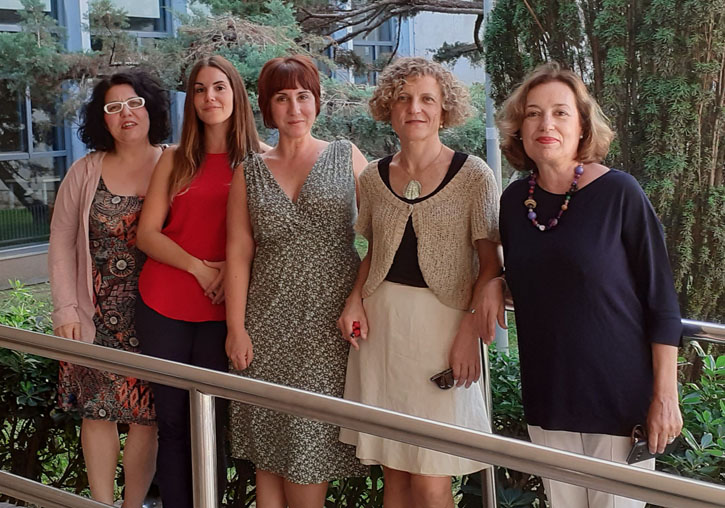
Has it always been believed that women and men have different and unequal abilities and qualities? The cliché that men are uncontrollable in love and women are constant, where and when does it arise? Have these issues been discussed only in England and France, or also in Spain and in the American world? Researchers from the University of Valencia (UV) work to find answers to these and other questions in the European project “Circulating Gender in the Global Enlightenment: Ideas, Network, Agencies” (CIRGEN), which analyses the conception and circulation of identities and gender roles in Eighteenth-century Europe and America, with special attention to the Hispanic world.
Provided with an Advanced Grant from the European Research Council (ERC) valued at 2.5 million Euros, it is the first project in the humanities and social sciences that obtains this funding in the Valencian Community. The initiative is attached to the University Institute for Women’s Studies and linked to the Department of Modern and Contemporary History of the University of Valencia and its research team is formed entirely by women.
In the Eighteenth century, that of the Enlightenment, the foundations were established with which societies discussed the difference between the sexes: what it consisted of and what intellectual, sentimental and social implications it had for private life and the collective order. For example, topics such as that men are passionate and women are sentimental in love are fixed in this period. The research team is investigating historical, printed and handwritten sources such as travel journals, letters, press, translations, creation literature and censorship of books, and is working on a database of translations of works of the so-called “dispute of the sexes ”and literature aimed at women.
An idea that we want to fight in the debate about gender identities and roles is that the Hispanic world was represented and perceived as an isolated and foreign space to modernity. With this work we want to build a less biased and anglocentric global history, and in which the European part not only includes the French and British contribution, but also the Hispanic one. In addition, we want to know if in the Eighteenth century there was a European or global discussion about gender identities and roles.
The team led by Mònica Bolufer, professor of the Department of Modern and Contemporary History of the UV, and which the researchers Isabel Burdiel, María Tausiet, Carolina Blutrach, Ester García, Laura Guinot and Elena Serrano are part of, is investigating what factors and why produced that some works were directed exclusively or in a special way to a female audience. These are books like Adelaide and Theodore or Letters on education by Madame de Genlis, which were recommended by pedagogues and moralists, but it is not known really to what extent they were read only or fundamentally by the women of the time. It is also intended to find out if, on the contrary, other works advised against or prohibited were read and for what reasons.
“These are some of the questions that drive the scientific work of the CIRGEN project, which also aims to renew historical knowledge about how the difference between men and women was understood in the past, and make it reach a wide audience through dissemination and teaching at all educational levels”, said Mònica Bolufer.
In this sense, on November 25 and 26 the Autonomous University of Madrid (UAM) hosts the seminar on Posibilidades de la Traducción: Corán, Género, Nación (‘Translation Possibilities: Quran, Gender, Nation’), co-organised by CIRGEN, together with the project La nación traducida. Ecologías de la traducción. 1668-1830 (‘The translated nation. Translation ecologies. 1668-1830’), in which the role of translation will be analysed as a way of transmitting gender identities and roles, and knowledge. With 4 sessions, it will address the Hispanic perspective of gender models, Islamic writing in European religion and culture, the relationship between translation and monarchy, and historical evolution from translator libraries to databases.
Conferences and dissemination
The research project began on January 1, 2019 and in this period the team has participated in several national and international conferences, such as the International Society of Eighteenth-Century Studies, in Edinburgh in July. Also, in May a seminar dedicated to motherhood was organised, and another one on the presence of women in scientific networks (September 2020) is in the works. There have also been several dissemination conferences on the themes of CIRGEN and two courses are planned for university and secondary teachers.
Mònica Bolufer
Mònica Bolufer has developed her career in social, cultural history and, with special emphasis, on gender issues. She has specialised in ways of life and thought during the Enlightenment, with special attention to the debate of the sexes, the intellectual activities of women, conceptions of intimacy and privacy, the regulation of behaviours through urbanity models and the construction of identities in travel stories. She has been vice president of the Spanish Foundation for Modern History (FEHM) and has been part of the Board of Directors of the Spanish Association for Research on Women’s History (AEIHM).
European Research Council
The European Research Council (ERC) was created by the European Commission in 2007 to boost research in all areas of knowledge, and attract scientific talent to Europe. It aims to finance long-term excellent projects and the teams that form them. Aid is prioritised for researchers who are starting their career, and who are creating or consolidating their own team. It grants several types of aid, such as Advanced Grants, Consolidator Grant, Proof of Concept, Synergy Grants and Starting Grants.
More information on the CIRGEN project: https://cirgen.eu/es/











